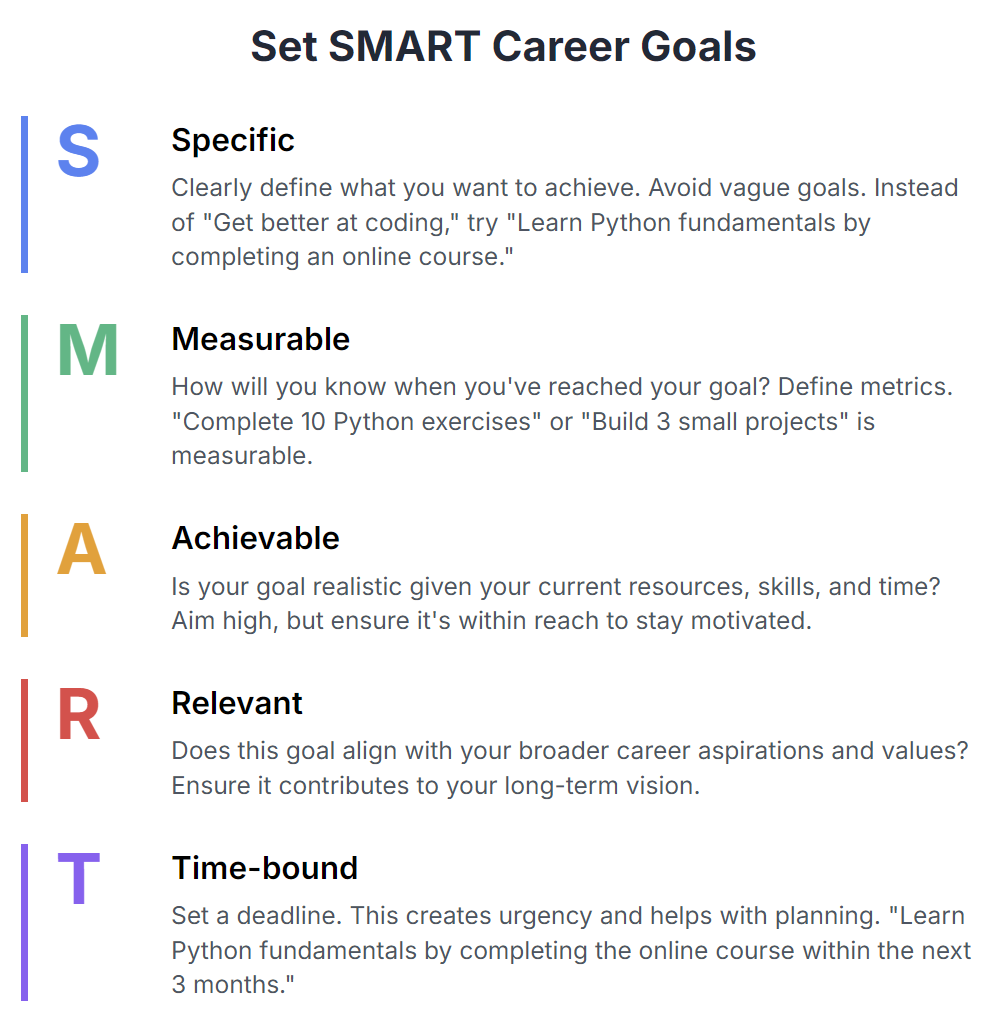7 Key Steps to Make a Career Plan That Works & Why Career Planning Is Important
Your career is a great part of your identity. But how do you plan to achieve your career goals? Developing a strategic plan is a pivotal part of your professional journey. Learn the benefits of career plan development.


Back
7 mins read
Where do you see yourself in the next five years — careerwise? While this may sound like a common question asked in interviews, it's quite pivotal in your career journey. A career is more than a job. It's the professional path that's anchored on your passions and interests.
Your career forms a significant part of your identity, and it's only fitting that you invest in a detailed plan that guarantees to make it a lasting success.
As Harrison Jones said,
"Failing to plan is planning to fail. Hope is not a plan."
Taking time to map out where you want to be as your career progresses is one of the best things you can do to achieve your dreams and aspirations.
A strategic career plan acts as a blueprint for living up to your full potential. It helps you scale the heights of achievements that may seem impossible to conquer. It is an integral part of the life planning process.
In this article, we look at career planning and why you must set aside time to develop a career plan to ensure job satisfaction.
What is Career Planning?

Career planning is the process of working out what career path you would like to pursue.
Career plan development involves creating long-term objectives and strategies to achieve your aspirations.
The planning process varies for every individual depending on their worldview, life experiences, and culture. However, the process generally helps you analyze your talent or skills to create a career path for you. It also allows you to identify the education, training, and personality traits required to fit in your career of choice.
Identifying these vital components helps you to adapt to a roadmap with the precise timelines, finances, and any other obligations required to achieve these goals.
7 Key Steps To Make a Career Plan

Planning your career may seem like an intimidating process. However, the following steps will help make things easier. They are:
1. Self-Exploration
Here, you seek to answer questions such as “Who am I?”, “What am I good at?”, “What motivates me?" and "What's important to me in a job?". These questions guide you on the education plans you must pursue to achieve your goals.
Taking specific steps to get your education and skill set career-ready keeps you motivated to graduate. Understanding how your personality traits impact job satisfaction is also an important part of the self-exploration process.
2. Occupational Exploration
Having learned your skills, values, and interests, you can now match your profile to a specific occupation.
Occupational exploration is the process of learning about a specific job, such as:
- Training required
- Education required
- Job Responsibilities
- Earnings
- Working conditions
- Expected job prospects
You can gather the information by conducting informational interviews, attending career fairs and office tours, and checking out websites and online videos.
3. Set Career Goals
Once you’ve explored yourself and researched occupations, it’s time to set clear and realistic career goals. These goals give your planning structure and help you stay focused.
Break your goals into:
- Short-term goals: e.g., complete a certification, get an internship, update your resume.
- Long-term goals: e.g., become a licensed professional, get promoted, start your own business.
Make sure your goals are SMART: Specific, Measurable, Achievable, Relevant, and Time-bound.
4. Create an Action Plan
Now that you know your goals, map out how you’ll get there. This is where your strategy takes shape.
Your plan might include:
- Education or training requirements
- Skill development (technical or soft skills)
- Gaining work experience (internships, part-time jobs, volunteering)
- Networking opportunities
Treat it like a living document — review it often and adjust it as your life changes.
5. Gain Experience and Build Skills
Start gaining hands-on experience to build both your resume and your confidence. The best way to test a career path is to try it in real life.
Ways to gain experience:
- Internships and apprenticeships
- Volunteering in relevant fields
- Freelance or part-time jobs
- Shadowing professionals
- Joining student organizations or competitions
These experiences help you refine your interests and build key competencies.
6. Evaluate and Reflect
Pause regularly to assess your progress. Are you on the right path? Are your goals still relevant?
Ask yourself:
- Do I still enjoy this work?
- Have my interests or values shifted?
- Are there obstacles I didn’t expect?
Reflection helps you course-correct before heading too far in the wrong direction.
7. Make a Decision and Take Action
With research done, goals set, and experience under your belt, it's time to make informed career decisions. Whether that means choosing a major, applying for a job, or switching fields — commit and take that next big step.
Confidence comes from preparation. Trust the process and take action, even if the path isn’t perfectly clear yet. Action creates clarity.
Why is Career Plan Development Important?

Career planning provides clarity on the direction and resources required to fulfill your goals. And because a big part of our lives is targeted toward achieving our goals, planning for a career that keeps you focused, motivated, and, more importantly, fulfilled is essential.
Here are the reasons why you should develop a career plan.
It’s a Way to Reflect on Your Needs and Wants from Work
A fulfilling career doesn’t happen by chance. Your career influences your income, social status, self-confidence, and social net worth. It's important to base your long-life work commitment on factors that matter to you.
Reflecting on your likes, dislikes, needs, and wants allows you to match your personality to the right career.
A career plan not only gravitates you in the right direction but also ensures sustainable productivity and performance. Listing in detail what you expect in a work environment helps you to focus on how best to connect your strengths to the career options available. Research shows that people who understand and leverage their strengths enjoy teamwork and their careers.
Lack of planning will make you vulnerable to taking jobs you don't like, leaving you feeling overworked and underappreciated. Over time, dissatisfaction and burnout are inevitable.
It Provides the Opportunity to Explore Career Options
The planning process allows you to take ownership of your career. Conducting purposeful and lengthy research on different career options helps you determine where your interests are best placed.
Test-driving various careers through internships or virtual work experiences gives you a better understanding of what the job entails.
It helps determine which factors do not resonate with you and which ones to explore further. The goal is to narrow the options to the career path that suits you best.
It Helps You Identify Your Transferable Skills
Transferable skills, or portable skills, are skills you can take and transfer from one career to another. Strong communication skills, excellent collaboration, and quick problem-solving skills are some good examples.
Besides the obvious place of technical skills, portable skills ensure that you work well and are, therefore, highly valuable to any organization. Identifying your transferable skills makes transitioning to a new career easier and more successful.
Here’s a brief process on how to identify your transferable skills
- List seven to ten transferable skills you have
- Write down how you’ve used the skills professionally and in your personal life
- Narrow the list to the five most impactful skills
- Write down all the achievements you’ve made with each of the skills
- Classify the skills from the most impactful to the least impactful
Now you have a list of your best transferable skills. As you apply for the jobs that interest you, ensure that your skills match the potential employer's desired set of portable skills, and you're well on your way to a good start.
It Provides Opportunity for Self-Exploration and Assessment
One of the best benefits of career planning is self-exploration and assessment. Knowing yourself as a person and your professional aspirations allows you to best evaluate the suitability of career options.
Self-assessment refers to the process of identifying your values, interests, and preferences for better career exploration. For example, is work-life balance important to you? Then you would consider it as part of your preferred working style.
The goal here is to gain insights about yourself to enable you to articulate what matters to you throughout your work search process. Once you identify your passions, strengths, and values, you can highlight possible career paths.
Even better, a career test can help you match your personality to several jobs. Additionally, the tool can help you gain a better perspective on the underlying motivations behind your ideal workplace and provide additional information to help you make better decisions.
Align With Career Goals
A successful career largely depends on deliberate goals. They provide a roadmap to the popular question, “Where do you see yourself in 10 years?” Through these goals, you can evaluate career options, choose the job you love, and help you create a long-term career development plan.
Most employers are interested in knowing your career goals for various reasons. They would like to know if the current position aligns with your career goals, whether you have a passion for the job, and if you have any ambitious plans for the future.
The career planning process inevitably helps you highlight multiple goals and aspirations as you evaluate yourself and explore various career options.
When you need to demonstrate how an open position aligns with your career goals, in an interview, for instance, you know how to pick the ones that align the most with the job posting and how to make them fit the role.
When Is the Right Time to Plan Your Career?

It’s said that fortune favors the prepared.
Ideally, career planning needs to start as early as the 9th grade because even though many of the details may not be clear, many young adults know where their interests lie (or at least have some idea). Again, starting early guarantees more time to explore career options depending on your likes and dislikes.
However, when to start is not cast in stone; career planning can begin anytime. Grades 10 to 12 and even the first two years of college are a great start. If your school offers a career planning course, take it. Studies show that they can increase career readiness.
Still, if you're already in the workplace, there is always room to re-evaluate your career decisions. This is especially true if you took a job "just to make money," are experiencing job dissatisfaction, or feel that a career change is long overdue.
Remember, career planning is a continuous process that can accommodate reviews and adjustments throughout your work life.
Related:
- What Gen Z Employees Want from a Job
- What Millennials Want in the Workplace
- How to Achieve a More Fulfilling Life
Do You Have a Career Plan?

Career planning is the first step toward creating your dream career. It allows you to explore your interests and motivations to determine the best trajectory to achieving your goals. As we've said before, you must take charge of your career.
In the words of Benjamin Franklin,
“If you fail to plan, you plan to fail.”
Discover your likes and dislikes and find a career match that leads to a job you love. In the long term, you will enjoy it and remain motivated to collaborate with your team members and achieve the set organizational goals.
With a positive mindset and clear career plan, you'll be less likely to blame bad luck or other external forces when things get tough. You’ll only need to make a few adjustments to get back on track.


Return to Blog







